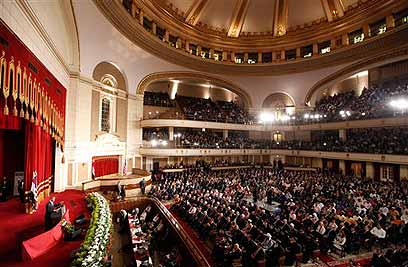
New National Security Council official: Iran can be stopped
Are Israel, US on collision path with Tehran? How can Iranian threat be stopped in age of Obama? What needs to be done to ensure continued support from North American Jewry? Interview with Dr. Eran Lerman upon assuming role of National Security Council deputy chief
"It isn't just the nuclear issue, but the whole gamut that compels Iran to present itself as the heir of the USSR and a counterforce against the West," Lerman explained to Ynet.
However, as opposed to many analysts and intelligence officials who feed the public with apocalyptical prophecies, Lerman actually sounds optimistic.
"Iran is like a huge, outspread octopus. But what has been going on within the country recently, the serious hit Hizbullah took in the Lebanese elections, as well as the change embodied by US President Barack Obama – who is allowing Muslim figures ostentatiously to have photo ops with him, all this is an indication that Iran's power quest, which nuclear capability is meant to bolster, is not unavoidable or a sure success. It can be fought and slowed," Lerman claimed.
For the last nine years, Dr. Lerman has served as the director of the American Jewish Committee's Middle East office. The AJC is one of the oldest Jewish organizations in the United States, established 103 years ago. Lerman started his work with the organization while Bill Clinton was still president and is finishing it as Jerusalem is showing certain suspicions about the new US administration.
"Israel is not on a collision path with the United States," said Lerman in the interview. "The US is still the US; the American people are still pro-Israel, and the foundations of the connection with Israel are strong. It is true that the US has undergone political changes that affect their perceptions and priorities, but, in its deepest essence, nothing has changed in the relationship with Israel."

Obama's Cairo speech. Not meant to please Jewish ears (Photo: AP)
"The American commitment to the fundamental values underlying the relationship with Israel is still in place. Obama emphasized this in his Cairo speech when he said that the relationship between the US and Israel is unbreakable. People in Israel perhaps were disappointed that he didn't deliver an ardently Zionist speech in Cairo, but they forgot that the speech was not meant to please the Jewish ear, but to capture the Muslim ear," he explained.
Lerman believes that it is still too early to judge how the White House change will affect US-Israel relations, but, one way or another, he says they are on firm ground: "Now there is a little friction, and this isn't necessarily a bad thing - as long as these frictions don't penetrate the discussion on defense aid and other subjects at the heart of the relationship. It is still early to know where this disagreement will lead, but I believe it is about to be solved."
Lack of sensitivity, lack of awareness
Alongside relations with the US administration, Israel has another relationship that is no less important, though often times perceived as trivial and taken for granted – the relationship with American Jewry. The American Jewish community is a very advanced one, very urban, very affluent, and intensely connected to Israel.
Though Israel invests in its relations with the Diaspora, Lerman did not withhold criticism from the upper echelons. "Israel has a problem reflected in its lack of awareness on all sorts topics," explained Lerman. "For instance, the issue of conversion and the relationship with the non-Orthodox denominations of Judaism. In these fields, the Israeli government's continuing perspective is reveals a lack of sensitivity to the deep structure of the Jewish community in North America."
Is there a chance that such a clear and understood relationship could fail? "One could say that the Jewish institution in North American is not a fragile glass cup, but a sturdy tin pot, but even if you through this on the ground, it will break. North American Jewry is organized around support for Israel. However, without serious work on the level of awareness, without investing hard work in this relationship, the relationship will grow apart," Lerman warned.
"The despicable treatment of non-Orthodox denominations is a very sore point. If the State of Israel grows darker in its religious interpretations and the Jewish character sharpens into one that American Jewry is uncomfortable with, there is potential for immense alienation," continued Lerman, noting that this is a particularly poignant source of contention given that most American Jews identify with these same non-Orthodox denominations.
"I belong to the optimist camp," he summarized. Lerman explained that great efforts need to be invested in this relationship from the political elite all the way down to middle school students. He even suggested creating a matriculation exam on world Jewry of our time as a step to increase awareness and sensitivity.
Jewish education will determine future
The Jews of the United States have had a difficult year. Unlike their European counterparts – who suffered mainly from anti-Semitic outbreaks over Israel's defensive in the Gaza Strip – the Jewish community in North America encountered difficulties because of the global financial crisis. Many American Jewish organizations rely on contributions in order to stay afloat, and these pools have dried up.
They were also directly hit by Bernard Madoff's debauchery. "Unlike Shakespeare's Shylock, Madoff didn't steal from the gentiles, but from his best friends," said Lerman ironically.
Even anti-Semitism, which exists under the surface of US society and shows its head from time to time as in the attack on the US Holocaust Museum, isn't a central problem for American Jews. "In America, particularly in Obama's America, this is a fringe phenomenon," assured Lerman.
Lerman is mainly concerned that North American Jews will stop sending their children to Jewish schools out of financial considerations. "These schools are not entitled to federal aid and are reliant on the purchasing power and donations from the Jewish community, as well as good will because there is nothing stopping a family from sending its children to public school for free," explained Lerman.
"This is a critical struggle because it is about Jewish continuity. The chance that this will stop is more worrisome than mixed marriages, which at least have the potential to expand the Jewish community."










